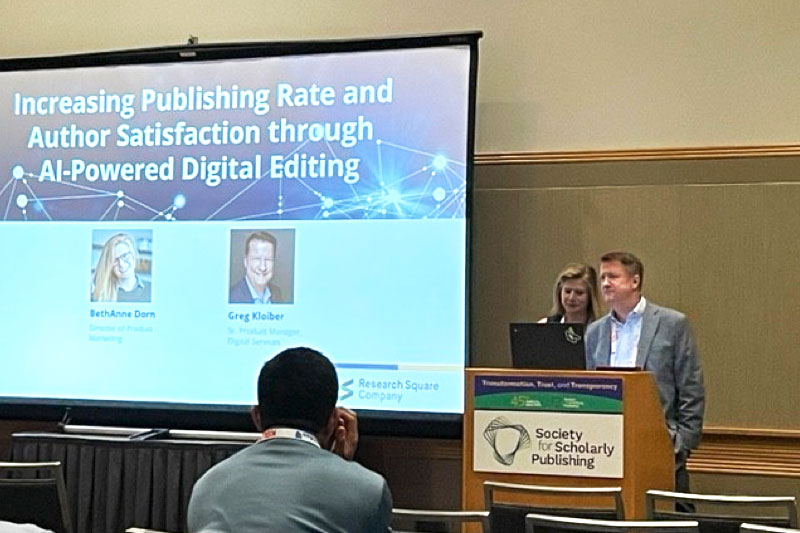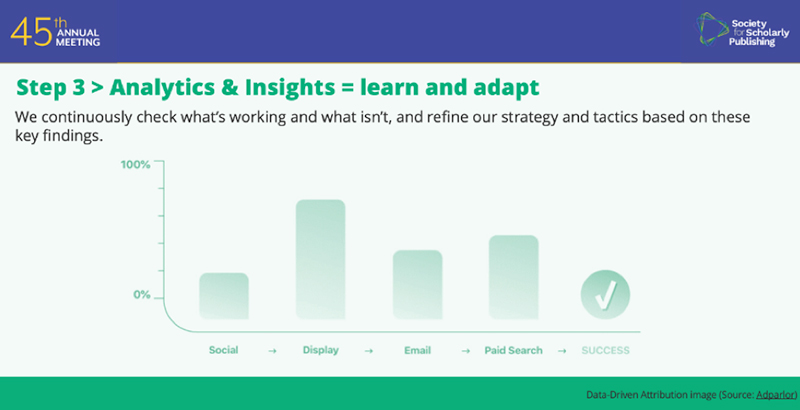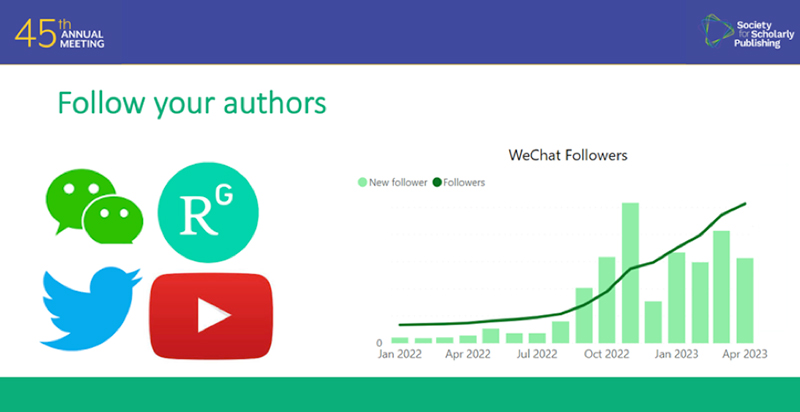BLOG
It was great to be part of #ssp2023 in Portland with the Society for Scholarly Publishing. Mithu Lucraft saw many TBI clients and friends over three busy days. The sessions covered a lot of ground under the conference themes of transformation, trust and transparency. Here are just a few highlights.
Open science transformation continues to be a key part of delivering greater transparency and trust. For example we heard how the eLife Sciences Publications, Ltd. preprint-led publication model is facilitating a faster, more transparent and understandable system, giving authors control over which version they choose to publish.

eLife’s preprint-led publication model #SSP2023

ResearchSquare at #SSP2023
AI, ChatGPT, and LLMs featured in many sessions. It’s evident that AI is already at work within academic publishing – for example Research Square showed in their session how AI-powered editing is improving author acceptance and editor decisions. The day 2 plenary also raised the potential of generative AI to increase equity in knowledge. But the plenary and the moderated debate were among sessions raising the potential risks and concerns for AI, and its potential to undermine the integrity of the system.
Trust was the headline for Elisabeth Bik’s excellent keynote, exploring the vast number of papers she has flagged to publishers for image manipulation. Ultimately, we need science to address the big challenges the world faces, but we need to be able to trust in science.
Mithu facilitated a well-attended session on the transition to open access, looking at the shift to author-centric marketing. Our speakers showcased how a combination of good data, author insights, and targeted messaging can enable publishers to reach authors with the right message at the right stage of an author’s journey. The majority of the audience represented publisher and editorial teams and nearly all had established fully OA/hybrid portfolios.

#SSP2023 – Elizabeth Bik keynote ties to the conference themes

AGU open access study #SSP2023
American Geophysical Union’s Matthew Giampoala shared AGU’s approach, balancing goals for open science, increasing equity, and sustainability. This included feedback from the community on the availability of funding and the likely impact of a move to open access. A strategy for an OA transition needs to support authors in understanding the availability of funding, and dispelling misconceptions around open access, for example that OA is lower quality.
Wiley’s Natasha White shared how Wiley has harnessed data and technologies to advance author-centric marketing. Her top tips included organising the data available to publishers to target authors effectively. By unifying existing data sources – for example when an author last published with you, whether they have published OA and who their funder is – it becomes possible to target authors with the right message to encourage a submission. Wiley have leveraged sophisticated marketing technology to be able to build customer segments and send messages out to those people at exactly the right time in their research journey. This requires a change in skills within the marketing team, to understand and act on these insights. Many of our audience identified skills gaps within their marketing teams, some having no access to marcomms expertise.

Wiley’s Natasha White on real-time analytics to inform marketing strategy

#SSP2023 – AIPP’s marketing exploring new channels including WeChat
Natasha also talked about the importance of real time analytics to be able to refine which channels to use for different customer segments. In American Institute of Physics Publishing’s Sara Girard’s presentation, she further showed how AIPP has built out their understanding of different customer profiles, using both market research to determine what matters to the AIPP community, and which channels to use to reach authors. Sara showed the impact that a geographic strategy, such as WeChat promotions to researchers in China, has made to their marketing and communication.
Mithu also participated on a further panel on introverted leadership, along with Will Schweitzer and Karen Stoll Farrell, facilitated by Julie Nash and Stephanie Lovegrove Hansen. A warm, engaged audience of predominantly introverts joined the panel in sharing experiences of how to work with extroverts and within extroverted business environments. There were excellent tips around working with allies, educating colleagues on what is needed to enable introverts to do their best work, and learning to use introvert superpowers to your advantage (e.g. excellent listening skills, taking the emotion out of difficult leadership conversations, and excelling in 1-2-1 discussions).
Many sessions also looked at DEI, sustainability and SDGs as areas where scholarly publishers continue to explore both how content and businesses can address inequalities. In each of these sessions, the sharing of best practice and data was flagged as a means to both show what changes publishers and societies can embrace, and where progress is being made.
There were many more sessions that didn’t make this summary, but given the high quality of the discussions at every session it’s safe to say it was a very successful SSP. Many thanks to the organising team for an excellent event!
Attendees of the conference can access all recordings from the SSP Whova app, or you can contact TBI for a copy of the slides from our session “Where are my authors? Marketing Analytics and Data for an Open Research Future.”
Were you at SSP? We’d love to hear your key take aways. Get in touch if any of the topics covered are areas you’d like to discuss with us.
TBI is registered in England
Registration No. 5375015
Registered office:
The Old Dairy, 12 Stephen Rd,
Headington, Oxford, OX3 9AY, UK